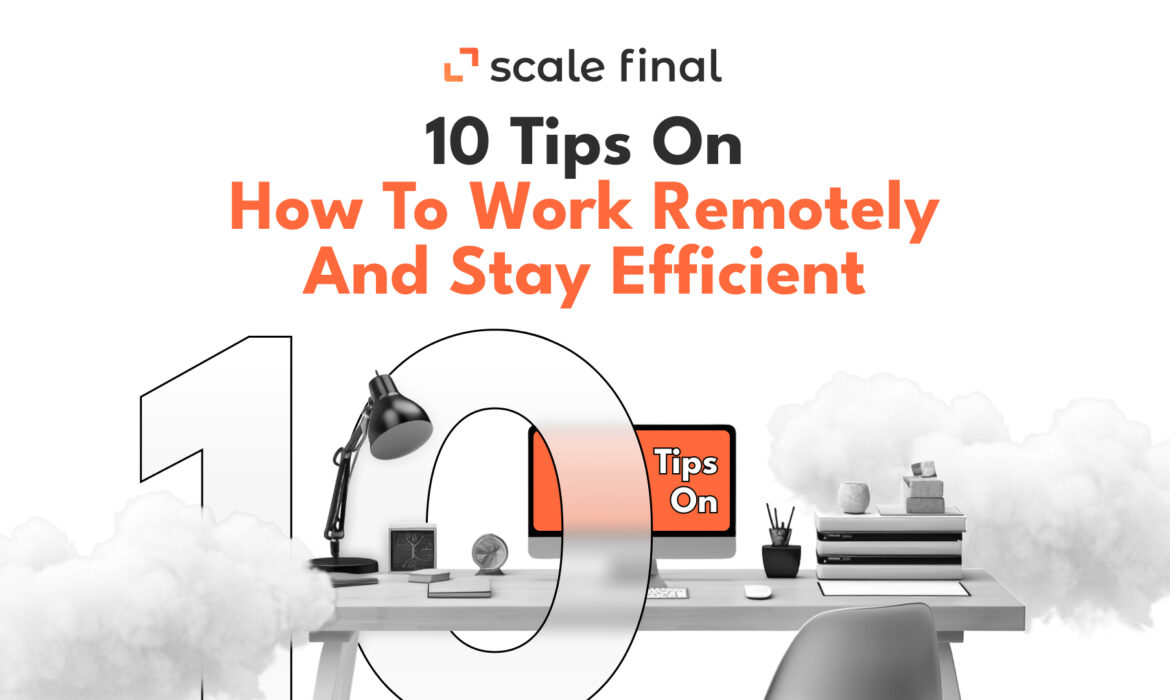Home • Blog • 10 Tips on How to Work Remotely and Stay Efficient
10 Tips on How to Work Remotely and Stay Efficient
This blog is not about pros and cons of remote work. Focus is laser: how to stay efficient when we work remotely.
It turns out it’s not so easy to assess your performance when you’re by yourself.
We all have our reasons to worry:
- how to determine my personal efficiency level?
- how to understand how fast can I accomplish tasks?
- Is it okay to ask for feedback from management and how often?
- How professional am I at what I do and how do I grow?
On the other side of the remote office, everyone is alone with their worries and sometimes their problems.
But perhaps the problem of personal effectiveness and professionalism is the main one.
So how do we unlock our potential?

With this approach, the team works flexibly, knows which way to go, and is not prone to burnout. All employees are doing what they enjoy, not just converting time into money.
But that’s just the only one side of a thing. Corporate one.
I decided to talk to each team member and we came up with these ten principles to help us stay effective when working remotely.
1. Exercise

When – in the morning, during your lunch break, after work – that’s up to you. But exercise is necessary. It is necessary for your physical and mental health. On the one hand, of course, all office workers suffer from a lack of exercise, but at least they go to work. For remote workers, exercise is minimal. Where to start? According to ASCM research, just five minutes of light physical activity every half hour is enough to improve health indicators. This means that you should at least get into the habit of changing your body position more often – for example, sitting, standing and, heaven forbid, lying down. On a yoga mat. We ignore the bed!!!
2. Set clear schedule

In the office space, there are always desk hours and a fixed place to work. When we leave work, we ideally put it outside the door. When working remotely, this causes even greater problems. Spread the work out separately and don’t take on tasks outside the set times. You can of course discuss this with your boss, but it is your right to close the work chats after the end of the working day.
3. Clear corporate culture

Even if an employee is not physically present, it’s important that they feel a sense of belonging and know that everyone on the team understands the value of their contribution. We have written extensively about our culture here. I would like to add that it is very cool when the company culture is passed on naturally from employee to employee and is not chiseled in marble and imposed from above. Because in this case, it can also be felt by a person who originally came to work remotely and has never been to the office.
4. Frequent sincups

Our team lives in different time zones. That’s why we practice a flexible start to the day with a standard working day of eight hours. We synchronize by Kiev time. We meet weekly at 2 p.m. for a sincup – apart from the fact that this sets the work rhythm, it makes us even more united, learn from each other and really understand that we are a team working for a cause. In our case, more than once our content writer got inspiration from such calls, and we have created cool content for social networks.
5. Real-life communication

Whether you’re an extrovert or introvert, the need for live communication exists in all of us. Social meetings with colleagues, which often take place without cameras, cannot satisfy this need. That’s why you shouldn’t forget live communication with your friends (likes on stories don’t count!!). Apart from the fact that the quality of this communication has a direct impact on your mental health, it’s a great way to diversify your free time: A change of scenery allows you to reset your brain and think more creatively – don’t read “How to spend time with your friends while working remotely full-time”.
6. One lazy day per week

Finally, it’s official. Having one lazy day per week can help reduce stress, and high blood pressure and improve mental health!
Don’t just take our word for it.
If you don’t pick a day to relax, you body will pick it for you…Relaxing really is a precursor to being more productive. We after think productivity means to work. It doesn’t. Productivity means making intentional choices towards a goal. And sometimes this choice could be to have a lazy day and replenish…You can optimize your sleep, your food, your gut, your energy – but unless you have some real time off, to sit around and do nothing and reflect and appreciate where you’re at, you’ll never repair or operate properly.
Tim Grey Health Optimizing Biohacker, Psychology Specialist.
7. Have fun

The dark horse and the underdog of solid working relationships. It’s hard to separate a welcoming home and boring work hours when you’re working completely remotely, but company traditions and informal gatherings (read: The Office) can also be a good way out. Who said work has to be boring anyway? Stay creative and celebrate creatively. You can’t force anyone to participate, but you could initiate or show your coworkers a good time.
8. Self-discipline

Even if your manager floods your inbox with emails about deadlines, no one will breathe behind your back, and notifications can be put on mute. It all boils down to self-discipline, once again. It’s not up to you alone, but you must understand which tasks to do and in what order, and you even have a head start, because that’s up to you. Everyone has their own routines, their own habits, their own self-organization know-how:
control the flow of information by turning off non-working messengers get important things done first remove completed tasks from your daily planner take a 5-minute break every 1.5-2 hours to reset your mind.
At Scale Final, we have our own approach. We always break large tasks into smaller tasks – sprints. In a sprint, we set specific tasks. That makes it easier to finish the whole. We work a lot on our calendars because our PM, Anastasiia, thinks the calendar is everyone’s best friend. We keep track of our projects in Asana for time management. We can manage the workload by weekly hours and keep track of our progress. So Anastasiia is right after all. We are all lucky to have you.
9. Trusting relationships

Talking in between and going to lunch together is an essential part of the communication that turns strangers into “work friends”. Remote – no excuse to be “feral”: correspond, call each other – discuss news. You shouldn’t become an anti-social person. Communicate in non-work chat, throw emoticons, gifs and top memes, take an interest in what’s going on inside each of us. We give more autonomy, encourage and motivate to work for results, hold meetings outside the company, meet in co-working spaces – all this brings the team closer together.
10. Reward yourself

Introduce some positive rituals for yourself. A salary is a good reward, but you’re more on your own when you work remotely, aren’t you? Something that is particularly lacking when working remotely is non-verbal communication. Imagine you’re sitting on a task, and you finally get it all done, exhale, bring it to your boss, and he smiles – and that feels good. Now, you need to icoprate these rewards into a working day. We’ve mastered this because of our GD Mariia, who orders a treat or junk food at the end of each week. After you’ve completed a challenging task or reached an important milestone, treat yourself to something nice – a short break, your favourite snack or a short walk in the fresh air. Rewards are a great motivator for completing tasks. Whether you should reward yourself for at least sitting down to work is debatable.
Conclusion
For more than 4 years, we have shown by our example that a team does not have to be tied to an office and a schedule to work coherently and productively. The working principles of the whole team are quickly understood by new people, and it is easier for them to understand and start working according to a well-established scheme than to fall into “remote” chaos. Any crisis is not an obstacle for remote workers if they do not feel lonely and ineffective.
It always pays to invest time and resources in the development of employees within the company. It’s an investment in your own business. Because when a team knows where it can grow and how to do so, it doesn’t set boundaries, but strives for the maximum.
Author
-
 ScaleFinal Content Writer
ScaleFinal Content WriterExperienced writer in different domains. I package meaning into words and bring people together. Know how to convey the vision and values of a product in writing. I like reading, movies, sports and blockchain.
View all posts






